Prologue
Many people think porcelain tiles and ceramic tiles are the same, although they are different and have unique properties. This is because porcelain tiles are a clay composition with few ingredients and high intensity, baked at a higher temperature than other tiles. This property makes them perfect for outdoor and damp spaces such as toilets. With a great variety of designs, colors and finishes, porcelain tiles are classic and contemporary flooring options known for their durability, sophistication and design adaptability. Don’t worry, as this blog is aimed at helping people make wise choices about porcelain tiles for their rooms/projects.
What Is Porcelain Tile?
One of the most beautiful and solid types of floor tiles is the porcelain tile. These tiles, with their beautiful appearance, can be installed in various areas. They contain special clay and are baked in an oven to withstand greater pressure. The color range of porcelain tiles is very wide – many different designs and colors allow you to finish the look you need.
Formation of Porcelain Tile?
Porcelain tile is made from a mixture of clay, feldspar and silica sand, which are then mixed, poured into molds and heated in a kiln at high temperatures. The overall composition of the mix will depend on characteristics such as shade, texture and durability, after which the mix is fired in a kiln.
Here’s a breakdown of the main components:
- Uses high quality clay mixed with natural minerals to create a denser and stronger tile.
- Contains feldspar to bond the clay particles together and provide strength.
- Quartz added to increase hardness making the tile resistant to scratches and abrasions.
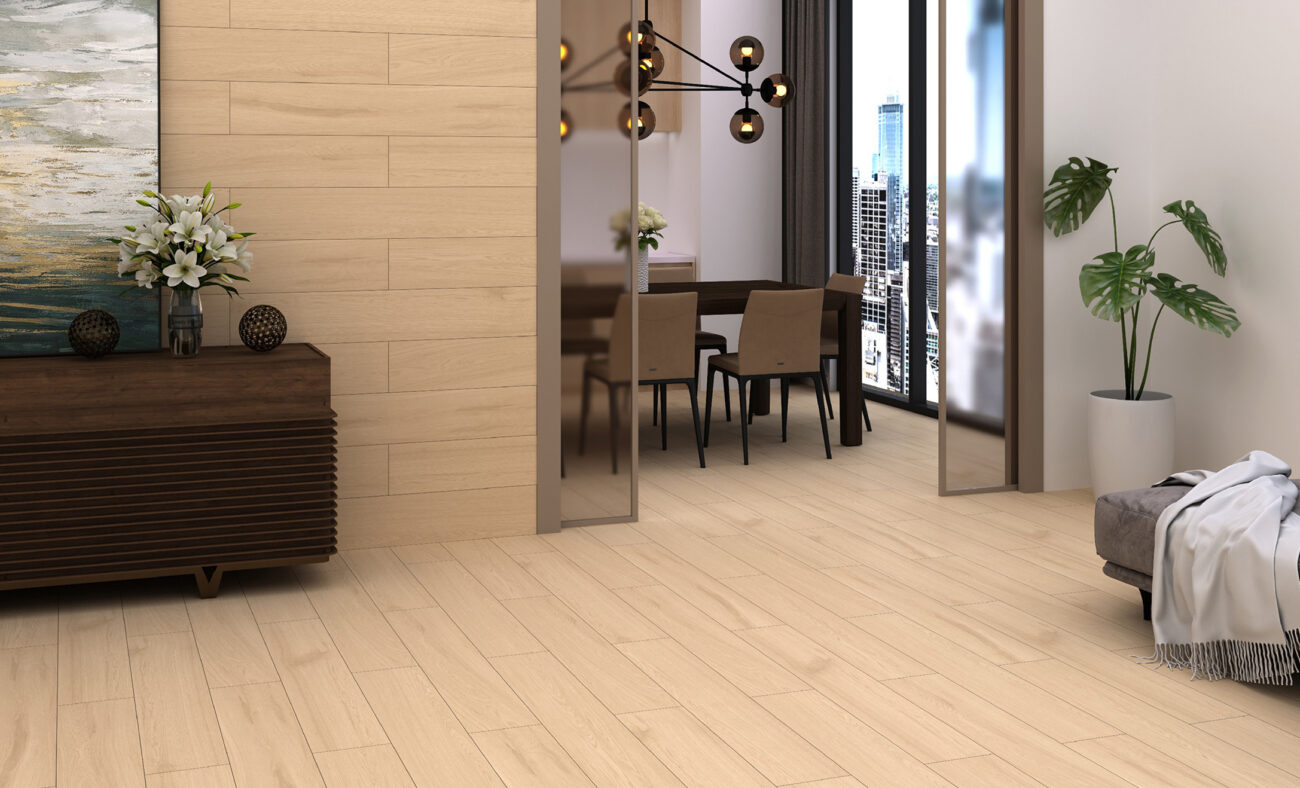
Types of Porcelain Tiles?
Porcelain tiles are available in different designs, textures, and dimensions, making it suitable for any job. Different types take into account different aesthetics and functional goals to simplify the selection for a particular project.
- Glazed Porcelain Tiles:
- Unglazed Porcelain Tiles:
- Polished Porcelain Tiles:
1. Glazed Porcelain Tiles:
Glazed porcelain tiles are tiles with a glass coating that makes them shiny, matte, or textured. They are the most common type of porcelain tile and can be used in many different ways. They are strong and don’t crack easily, but they can break if they are exposed to extreme heat or cold.
Advantages:
- Variety of designs: Customizable colors, patterns, finishes.
- Stain Resistance: Protects tiles from stains, making cleaning easier.
- Ideal for high-traffic areas: style and endurance.
2. Unglazed Porcelain Tiles:
Unglazed porcelain tiles are tiles without a glass coating. These items share the same color and design throughout, and we use them outside because they can withstand harsh weather. These tiles have a rough surface that is easy to clean and doesn’t get dirty easily.
Advantages:
- Durability: Continuous color and design reduces chip or scratch recognition.
- Slip Resistance: Offers slip resistance due to raised grain patterns in damp environments.
- Ideal For: Ideal for high traffic areas, slippery areas like outdoors, stairways, or indoor corridors.
3. Polished Porcelain Tiles:
Polished porcelain tiles are tiles that have been polished to make them shiny. This process also makes the colors and patterns look better.
Advantages:
- Elegant Appearance: Glossy Finish for Shining Appearance and Imitates a natural stone or marble look.
- Reflective Quality: Provides reflective quality, making rooms lighter.
- Ideal For: Ideal for elegant areas like living rooms, formal dining, or luxurious rooms.
Porcelain tile supplier in India?
Balaji Expo India is a leading supplier of premium porcelain tiles in India. Our Collaborated brand Spenza offers a diverse range of high-quality tiles known for their durability, aesthetic appeal, and exceptional craftsmanship. With a focus on customer satisfaction and personalized service, we strive to help you transform your space with stunning and functional porcelain tile solutions.
Porcelain Tiles Prices in India?
Porcelain tiles vary in quality, quantity, and size, affecting their price. Buyers typically purchase standard tiles in quantities of 100 square feet and pay a base price for each. However, premium porcelain tiles cost more per square foot, reflecting their higher quality and features.
Uses of Porcelain Tiles?
Porcelain tile durability and versatility make them suitable for a wide range of spaces:
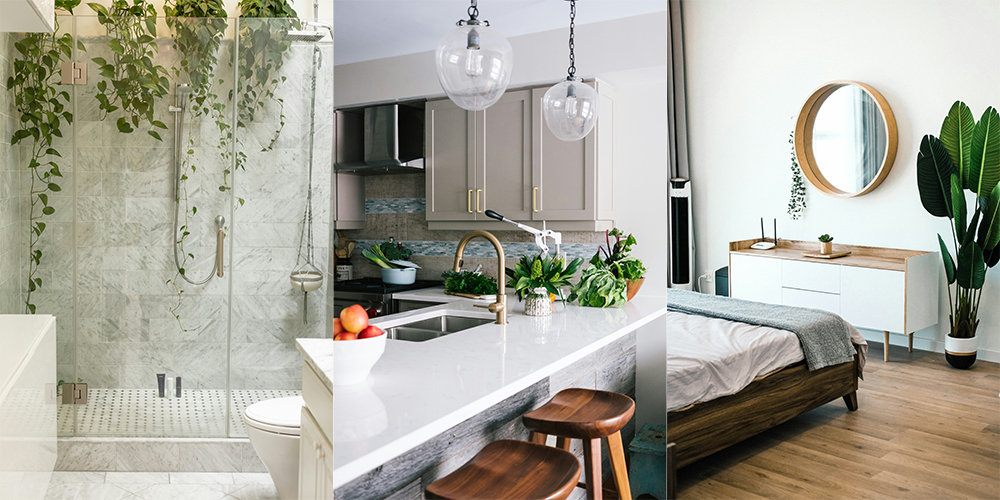
Residential:
- Bathrooms: High moisture resistance and slip-resistant options.
- Kitchens: Stain-resistant and easy to clean.
- Living rooms: A touch of elegance can be added to it and suits both floors and walls.
- Bedrooms: Creates a serene and stylish ambiance.
- Balconies and terraces: Weather-resistant and durable.
Commercial:
- Restaurants and cafes: Adds a modern and sophisticated look.
- Hotels and resorts: Provides a luxurious and welcoming atmosphere.
- Retail stores: Creates a visually appealing and durable flooring surface.
- Office space: Offers a professional and polished appearance.
- Hospitals: Meets hygienic standards and is easy to maintain.
Understanding Tile Specifications?
The coefficient of friction measures slip resistance in areas like bathrooms and kitchens, while the PEI rating indicates durability and suitability for different traffic levels.
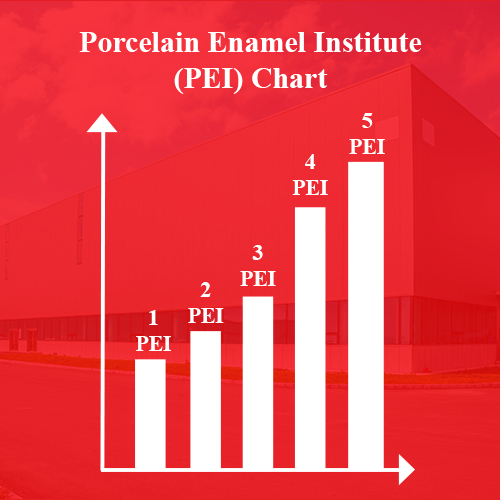
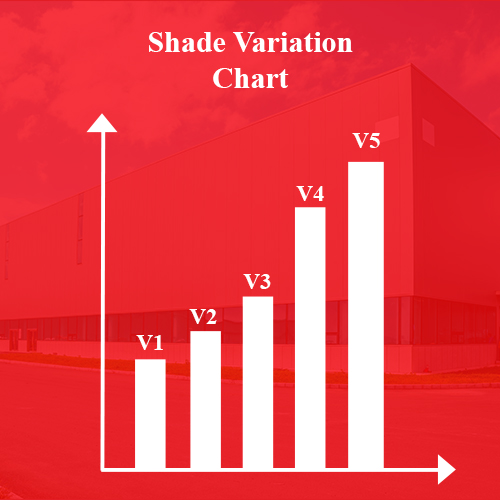
PEI rating is a system used to classify the durability of porcelain and ceramic tiles. It ranges from 1 to 5, with 1 being the least durable and 5 being the most durable.
- PEI 1: Suitable for walls only.
- PEI 2: Suitable for light traffic areas like residential bathrooms.
- PEI 3: Suitable for light to moderate traffic in residential settings.
- PEI 4: Suitable for residential use and light commercial traffic.
- PEI 5: Suitable for high-traffic commercial areas like shopping malls and airports.
Shade Variation
Each tile exhibits distinct differences in color, tone, and texture, making it one-of-a-kind.
- V1: Uniform Appearance: Minimal variation in colors and patterns.
- V2: Slight Variation: Noticeable variations in texture or pattern within similar color tones.
- V3: Moderate Variation: Consistent base color, but significant color variations among individual tiles.
- V4: Substantial Variation: A wide range of colors, creating a visually diverse and artistic installation.
How to Choose the Perfect Tiles for Your Home?
Choosing the right tiles involves thinking about where you’ll use them (floors, walls, or backsplashes), looking at different designs, and checking MSI sample boards for information about the tiles.
- Match design: Select tile that complements the interior style.
- Prioritize durability: Choose tile based on intended use.
- Consider maintenance: Consider ease of cleaning and maintenance.
Benefits of Using Porcelain Tiles?
- Durability: Porcelain tiles are very hard, resistant to water, and stain-proof.
- Water resistance: Suitable for both indoor and outdoor use.
- Versatility: Wide range of colors, patterns, and finishes.
- Stain resistance: Easy to clean and maintain.
- Hypoallergenic: Non-porous and allergen-free.
- Fire resistance: Non-combustible.
- Increased property value: Can increase home value.
- Aesthetic Appeal: durable, versatile, beautiful, and affordable.
Get in Touch!
Upgrade your home or business with porcelain tiles. They’re strong, beautiful, and easy to care for. Choose from many styles, colors, and textures to match your taste and design.
Connect with us:
- Email: Support@balajiexpoindia.com
- Phone: +91 9711497319
- Address: 70/1/1 , MARBLE MARKET, DELHI 110085
Let us help you pick the perfect porcelain tiles to make your space look amazing.

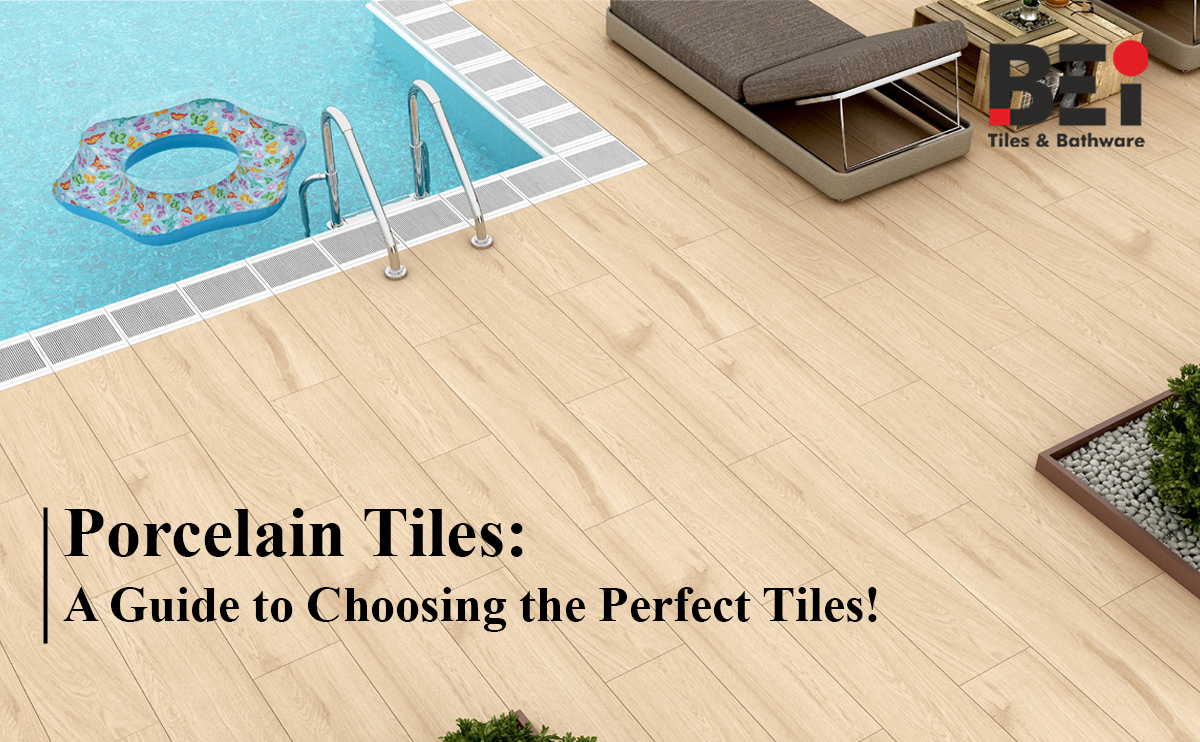
One thought on “Porcelain Tiles: A Guide to Choosing the Perfect Tiles!”